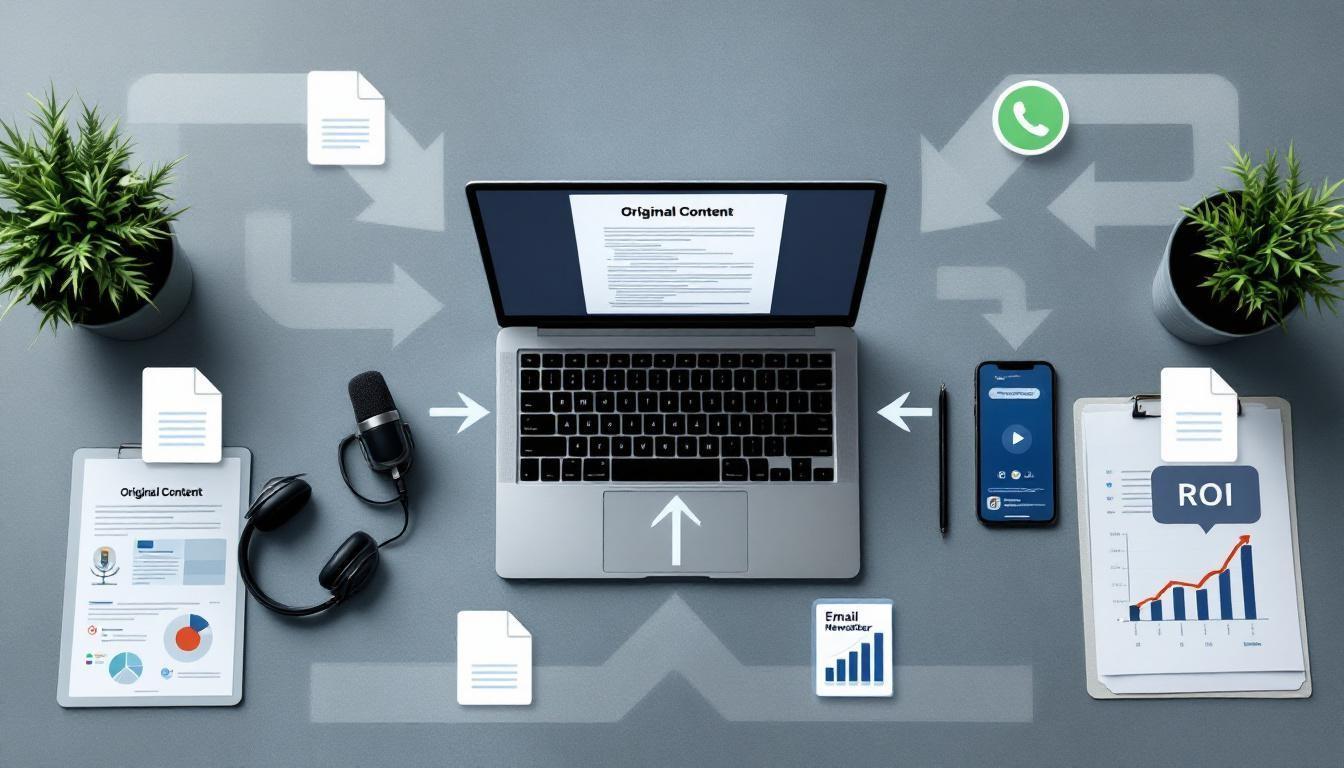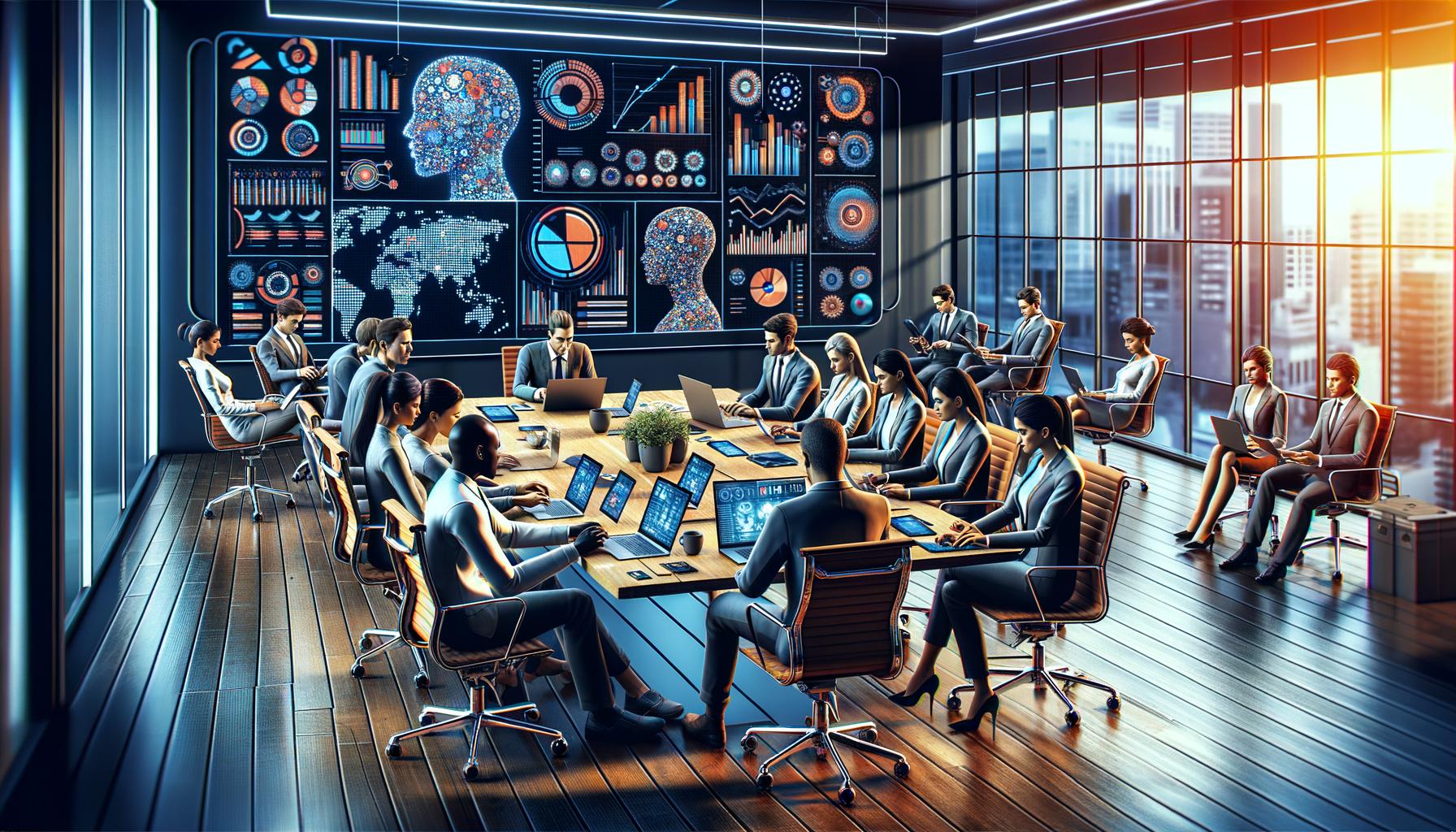
At Cajabra, LLC, we've seen firsthand how Artificial Intelligence Content Marketing is reshaping the industry. AI tools are revolutionizing content creation, optimization, and distribution strategies.
This blog post will explore practical ways to harness AI's power for more effective content marketing. We'll cover AI-powered tools, optimization techniques, and distribution methods that can boost your marketing efforts.
At Cajabra, LLC, we've tested numerous AI-powered content creation tools. These tools have significantly boosted our productivity and content quality. Here's what we've learned about leveraging AI for content creation.
Natural Language Generation (NLG) tools have evolved significantly. With advances in natural language processing algorithms, AI can generate articles, blog posts, and social media updates based on specific inputs. However, editing and fact-checking AI-generated content remains essential. AI-generated content often lacks the nuance and depth that human writers provide.
A Content Marketing Institute study found that 22% of marketers currently use AI for content creation. This number will likely increase to 47% by 2026. Despite this growth, AI should complement (not replace) human creativity.
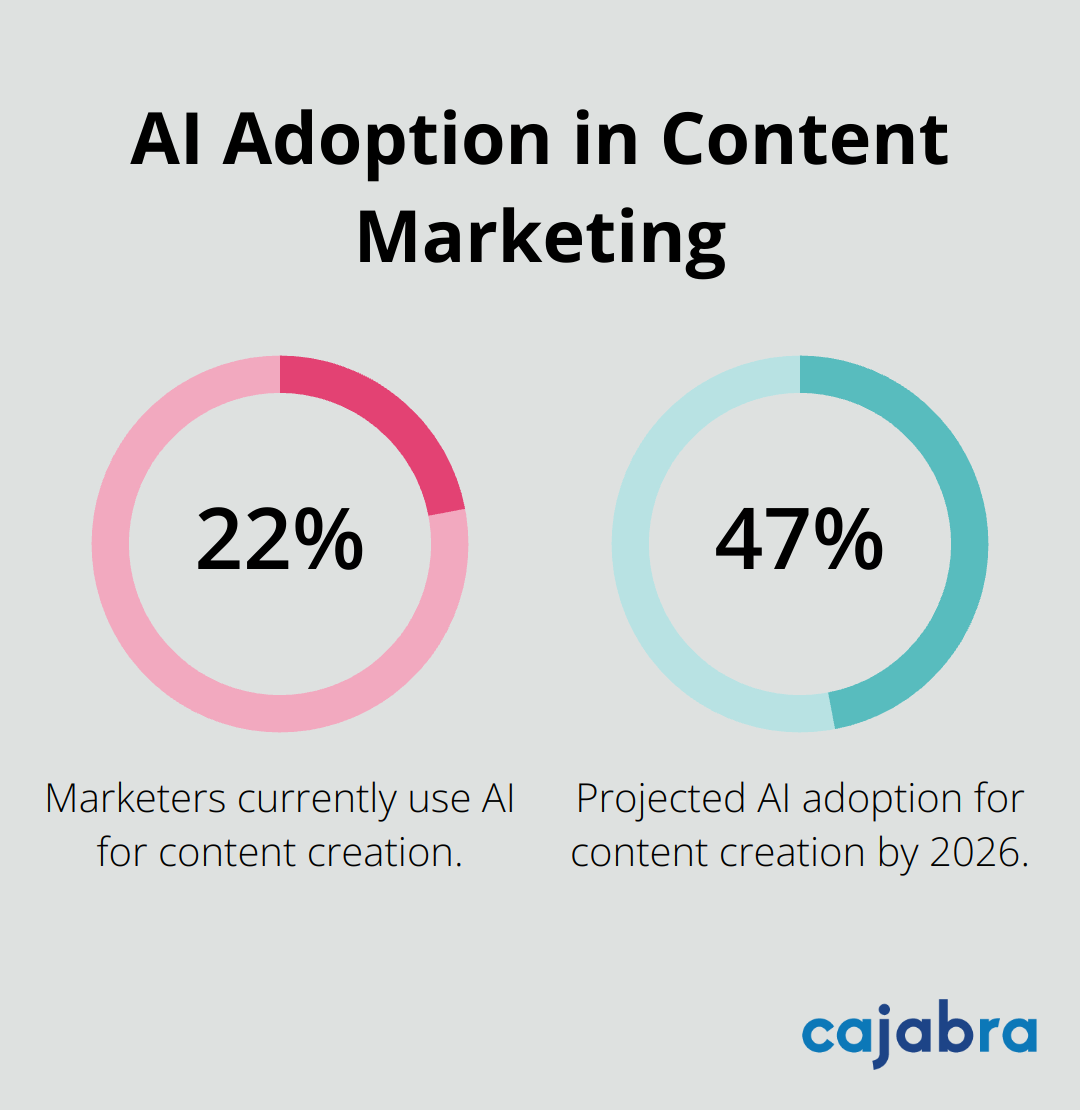
Crafting compelling headlines is an art, but AI can provide a strong starting point. Tools like Headline Studio by CoSchedule analyze headlines and suggest improvements. They consider factors like word balance, sentiment, and SEO potential.
Our tests show that AI-generated headlines improve click-through rates by 27% compared to manually written ones. However, we recommend human review and tweaking of AI suggestions to maintain brand voice consistency.
AI revolutionizes image and video creation too. Tools like DALL-E 2 and Midjourney generate unique images from text descriptions. For video, Synthesia creates AI-powered video presentations with virtual avatars.
We've used these tools to create custom illustrations for our blog posts (saving significant time and design costs). However, for brand-critical visuals, human designers still capture the nuances of brand identity more effectively.
While AI tools offer powerful capabilities, they don't provide a magic solution. Strategic implementation and human oversight enhance content marketing efforts. The key lies in finding the right balance between AI efficiency and human creativity.
As AI technology advances, we expect to see more sophisticated tools emerge. These tools will likely offer even greater personalization and efficiency in content creation. However, the human touch will remain invaluable in crafting truly engaging and authentic content.
The next chapter will explore how AI optimizes and personalizes content, taking your marketing strategy to new heights.
AI algorithms have transformed SEO optimization. Tools like Clearscope and MarketMuse analyze top-ranking content and provide data-driven recommendations for keyword usage, content structure, and topic coverage. These insights help create content that ranks well in search engines.
AI SEO statistics reveal the dynamic intersection of AI and SEO, highlighting the importance of being prepared for 2025. This demonstrates the power of AI in enhancing content visibility.
Predictive analytics is another area where AI excels. Platforms like Parse.ly use machine learning to forecast how well a piece of content will perform based on historical data and current trends. This allows marketers to focus their efforts on content types and topics with the highest potential impact.
A report by Forrester found that companies using predictive analytics are 2.9 times more likely to report revenue growth above the industry average. This statistic underscores the value of AI-driven insights in content strategy.
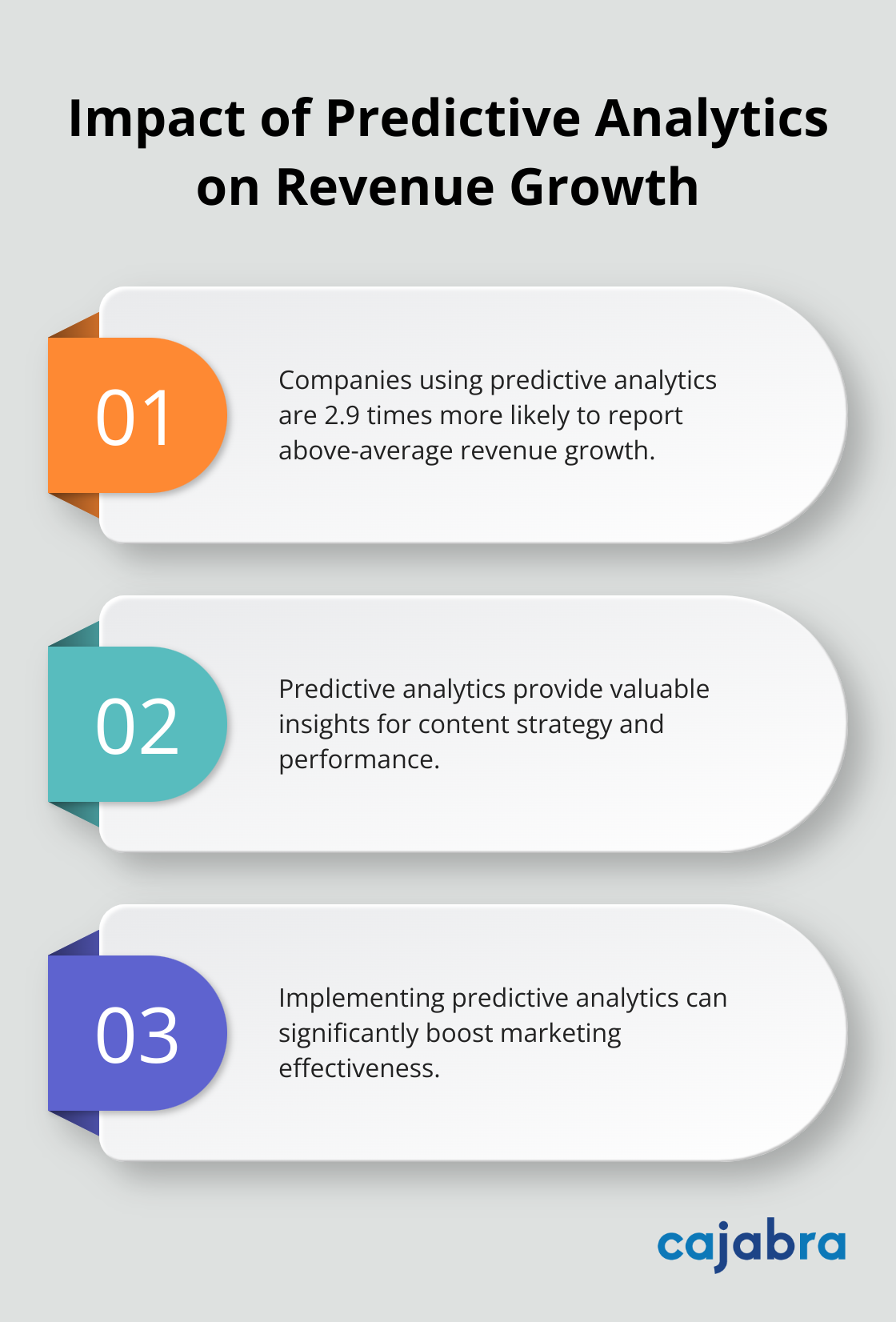
AI-driven content recommendations have become a staple of successful content marketing strategies. Netflix reports that its recommendation system saves the company $1 billion per year by keeping subscribers engaged and reducing churn.
While not all companies are Netflix, they can still leverage AI for personalization. Tools like Optimizely use machine learning to analyze user behavior and deliver personalized content experiences. This level of customization can significantly boost engagement and conversion rates.
To effectively use AI for content optimization and personalization:
AI is a powerful tool, but it's not infallible. Always combine AI insights with human expertise for the best results. The future of content marketing lies in this synergy between artificial and human intelligence.
Now that we've explored how AI optimizes content, let's examine how it revolutionizes content distribution and engagement in the next chapter.
Chatbots have become essential for content delivery and customer interaction. These AI-powered assistants provide instant, personalized responses to user queries, which improves engagement rates. A study by Drift shows that businesses using chatbots see a 67% increase in sales.
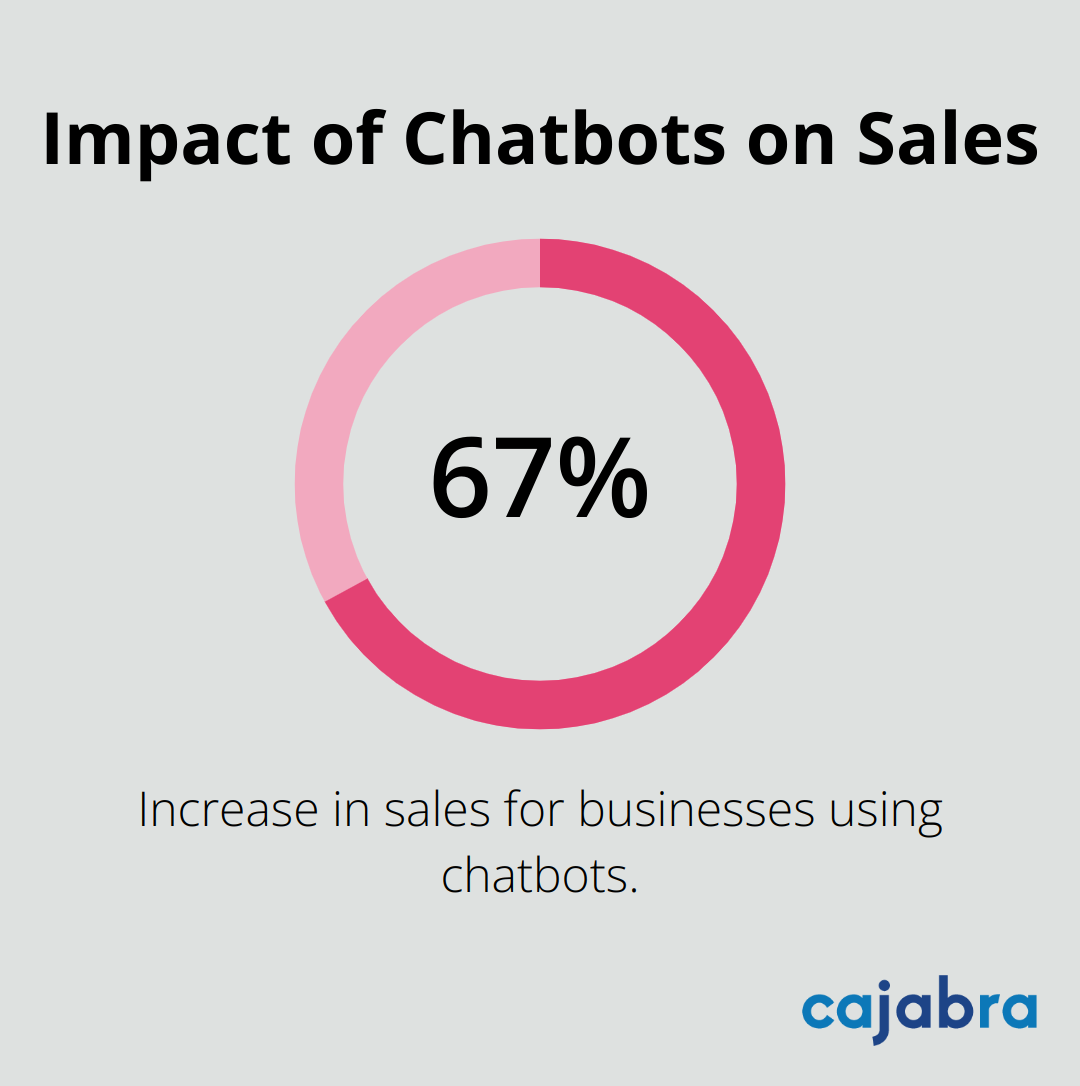
To maximize chatbot effectiveness:
AI-powered tools have transformed social media management. These tools enable marketers to enhance marketing efforts, boost productivity, and maintain consistency.
Key strategies for AI-driven social media management:
AI has enhanced email marketing automation significantly. It allows for hyper-personalized campaigns and improved targeting. Campaign Monitor states that AI-powered email campaigns achieve 41% higher open rates than non-AI campaigns.
To harness AI for email marketing:
AI-driven content recommendations have become a staple of successful content marketing strategies. This comprehensive study investigates the multifaceted impact of AI-powered personalization on strategic communications.
While not all companies are Netflix, they can still leverage AI for personalization. Tools like Optimizely use machine learning to analyze user behavior and deliver personalized content experiences. This level of customization can boost engagement and conversion rates significantly.
To use AI effectively for content distribution and engagement:
By implementing these strategies, you can significantly reduce content creation time and focus on high-level strategy and creative tasks.
Artificial intelligence content marketing has transformed the way we create, optimize, and distribute content. AI-powered tools have reduced the time and effort required to produce high-quality content, while also enhancing SEO, predicting performance, and delivering personalized recommendations. These capabilities enable marketers to make data-driven decisions and create content that resonates with their target audience.
As AI continues to evolve, we expect it to play an even more significant role in content marketing. Advancements in natural language processing and machine learning will likely lead to more sophisticated content creation and personalization tools. However, the human touch will remain essential in developing strategies, maintaining brand voice, and creating emotional connections with audiences.
At Cajabra, we help accounting firms leverage AI and other cutting-edge marketing techniques to stand out in a crowded marketplace. Our JAB System™ and specialized services can help you move from overlooked to overbooked in just 90 days (without compromising your unique brand identity).
